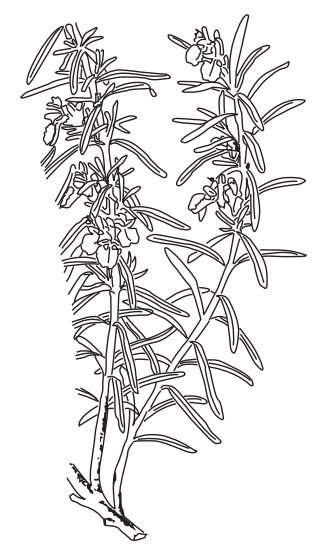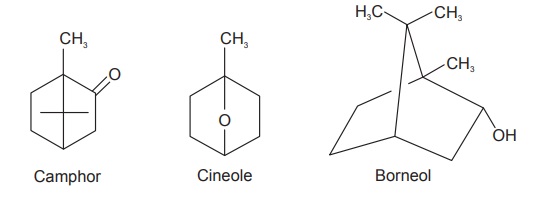Rosemary Oil
| Home | | Pharmacognosy |Chapter: Pharmacognosy and Phytochemistry : Drugs Containing Volatile Oils
Oil of Rosemary is distilled from the flowering tops of leafy twigs of Rosmarinus officinalis, belonging to family Lamiaceae.
ROSEMARY OIL
Biological Source
Oil of Rosemary is distilled from the flowering tops of
leafy twigs of Rosmarinus officinalis, belonging to family Lamiaceae.
Geographical Source
The plant is native to southern Europe and the oil is
produced principally in Spain and North Africa.
Characteristics
Rosemary is an evergreen shrub with rigid, opposite,
sessile, persistent, linear, and coriaceous leaves from about 3.5 cm long and
2–4 mm broad. Numerous branched trichomes make the lower leaf surface grey and
woolly; typical labiate glandular hairs contain the volatile oil.

Rosmarinus officinalis
Chemical Constituents
The fresh material yields about 1–2% of volatile oil
containing 0.8–6% of esters, and 8–20% of alcohols. The principal constituents
are 1,8-cineole, borneol, camphor, bornyl acetate, and monoterpene
hydrocarbons. Rosemary leaves also contain the triterpene alcohols α- and β-amyrins, rosmarinic acid,
rofficerone caffeic acid, chlorogenic acid, α-hydroxydihydrocaffeic acid, glycosides
of luteolin and diosmetin, carnosolic acid,
carnosol, rosmanol, epirosmanol, and isorosmanol.

Uses
The oil is mainly used in the perfumery industry. It is a
component of soap liniment and is frequently used in aromatherapy. The oil is
also used for gastrointestinal disturbances, to enhance urinary and digestive
elimination function and as a choleretic or cholagogue. Topically, it is applied
to clear nasal passages, for colds, as a mouthwash and for rheumatic ailments.
Rosemary extracts are used in food technology as antioxidants and
preservatives.
Cornosolic acid, a diterpene isolated from R. officinalis, shows a strong
inhibition of HIV-1-protease activity. It shows cytotoxicity at the dose which
is close to effective antiviral dose.
Adulteration
Adulteration of the oil with Spanish eucalyptus oil, camphor
oil, and turpentine fractions is common.
Marketed Products
It is one of the ingredients of the preparations known as
Anti-Dandruff Hair Oil, Anti-Dandruff Shampoo, Protein Shampoo for oily/greasy
hair, and Erina Plus (Himalaya Drug Company).
